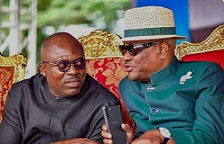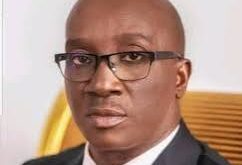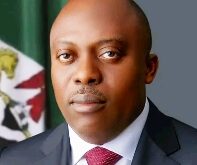… Sixty Years in Search of A Better Country
By Young Erhiurhoro, Warri
Without compromising the facts, the title of this short discourse is quite synonymous with the title of a book authored by an erudite and a prolific writer, Alhaji Ahmadu Kurfi, an acclaimed public administrator in the Nigerian Civil Service in the 60s to the 80s on the conduct of general elections in the country.
The title of his book is, ‘Sixty Years Long March towards Democracy (Nigerian General Election 1951 – 2011).’
The book spoke volumes of electoral fraud that marred our general elections in the period under review. The most intriguing part of the book is when the late President Umaru Musa Yar’adua acknowledged in his inaugural speech on May 29, 2007, that the elections (2007) that brought him into power were seriously flawed going by the accounts of the national and international groups that observed the conduct of the elections, which were rated the worst in the country’s elections history spanning 85 years from when elections were first held in the country.
To view the above statement by President Yar’adua with the eyes of the hawk: For an elected president of a country like Nigeria to have the boldness to announced to the world that the election that brought him into power was the worst in terms of electoral frauds and crimes since 1922; it only goes to show that the second name of Nigeria is, ‘CORRUPTION’.
Secondly, it showed that Nigeria is practicing a new form of democracy which I describe as, ‘Militarized Democracy’. To put it more succinctly, this new form of democracy is only being practiced in few countries in Africa. This new form of democracy is defined as the government of the few, by the few and for the few. It’s completely opposite to the tenets of true democracy as being practiced by those countries that first preached it as the best form of government for every nation.
Still on the issue of electoral frauds and crimes in Nigeria, if the late President Yar’adua could adjudge his election as the worst in the nation’s political history, then what is the state or situation in the election that brought President Muhammadu Buhari to power? Can it be adjudged as the best or the worse of the worst in the country? I leave the answer to President Buhari to present to Nigerians in this year’s independence anniversary after sixty years.
Though there is no country in the world today, even with modern electoral technology where elections can be described as one hundred percent free and fair, but Nigeria’s case is worrisome and heavily militarized by the political class in the country.
Moving away from election matters as we are assessing sixty years of a search for a better country, as the title of this discourse implies, let’s look at some of our other national issues together.
First, let President Buhari as the head of the Nigerian government tell Nigerians and the world, how he has gone with the corrupt cases of Ibrahim Magu of the EFCC and the forensic audit of the NDDC as conducted, including all the other drama that played out in the course of investigations in the NDDC saga?
Secondly, we are very unlucky and quite unfortunate that the corona virus pandemic ravaging the entire globe now couldn’t have a little sympathy on us as the most corrupt country in Africa; knowing fully well that all our cases with fund management in this country since 1960 have always been fraudulent and looting. How can the government announce to people that since the outbreak of the corona virus in the country in March this year, you spent over N40 billion to fight the virus?
In fact, according to the arguments of so many Nigerians, the deadly corona virus has become an ocean where the water never runs dry, whether in the dry or wet seasons. It’s a loophole, without doubt, where the few that are politically connected are milking dry our economic life wire.
To this political class in the context of our earlier definition of the militarized form of democracy, they are on their knees every day, praying for the endless continuity of the ravaging corona virus pandemic in the country – only to the detriment and pains of the vulnerable commoners of this country.
Thirdly, we can’t forget easily to point to the recent economic woes unleashed on the Nigerian citizenry when discussing sixty years of searching for a better Nigeria. What are we talking about? It’s about the recent increment in prices of petroleum products especially the PMS and electricity tariff.
This is more than adding salt to an already festering injury. Nigerians at the moment are like a wounded lion, waiting for whom to devour. I bet you, if the vulnerable and the less privileged ones in the country can have free access to the Presidential Villa, like the house of a common and poor man, they could unleash untold havoc.
At a time like this when we have just started breathing the air of hope and little respite from the gulag of the corona virus pandemic, the Nigerian government would consider it necessary to increase the economic bondage of the people by increasing pump price of fuel and electricity billings. As somebody said recently at a media briefing and I quote, “Our political leaders are comfortable with the workings of the Nigerian government because they have free access to government money in everything they do. If they can labour a minute to buy anything as we the commoners do, they won’t be in haste to pass all these unnecessary bills. Let them come to taste a minute what we are passing through in this country. Then, they will know that Nigeria is already a failed nation.”
In fact, our political leaders are truly comfortable because they lean on the government for their daily living. To further buttress this point, the hospitals they go to are not located here in Nigeria, their children’s schools are not found in Nigeria, their electricity/power is not supplied by the power holding companies in the country, their clothing are made in foreign countries, their meals are prepared in advanced countries and virtually everything you can name in their day-to-day living are not provided in Nigeria here. In such a glaring scenario as Nigeria finds herself after sixty years unfruitful search for a better country, how do you think this set of political leaders would think of our welfare and how to make life comfortable and worth living when they source for their daily needs from other countries?
They don’t care about the high insecurity challenges bedeviling the country at the moment because they have succeeded in drafting stronger security network provision to all their official residences. Our hospitals are collapsing one after the other every year and it is none of their business because at the verge of a common malaria fever, they are flown outside the shores of the country for immediate medical attention. Our educational institutions are nothing than ordinary mountains of yesterday, yet they make us believe that they have done so much in the education sector. What about our road networks? These are death traps for daily accident occurrences for common Nigerians alone. There are helicopters and aero-planes to fly them from their sitting room to toilet whenever the need arises. Have we forgotten terrorism and rape among the unprotected in this country? President Buhari won’t feel the bitter pains of rape now because all his female children whether married or not, are well protected by the combined team of the Nigerian armed forces.
Conclusively, sixty years is such a long time to write about the pains, agonies and the woes Nigerians are passing through in the hands of our political leaders, even on daily basis. As I always say, let’s continue to write on the pages of newspapers whether they pay attention or not; but posterity will stand on the part of truth to vindicate us the writers at the due season.
In fact, it’s really frightening and very disheartening that, after sixty years of long search for a better country, Nigeria is growing worse and worse every day on the workings of government. So many people thought, including the same British government that gave us independence in 1960, that by now, sixty years of freedom and independence, Nigeria would have been the best country in Africa, considering our huge and enormous natural resources. However, their dreams for Nigeria, as a country, are just mirages. Nigeria, where art thou?
Young Erhiurhoro; Kjc is a reporter and a member of the Urhobo Historical Society.
 PH Mundial – Port Harcourt Online Newspaper News Across The Region
PH Mundial – Port Harcourt Online Newspaper News Across The Region




